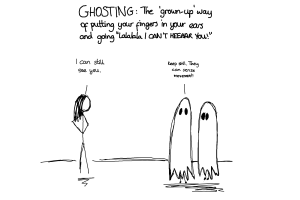Though the term wasn’t around in my dating days, the concept certainly was. Ghosting is the word for what happens when the person you’ve been seeing simply disappears. One day, you’re enjoying dinner together, hopeful this relationship is going someplace; the next day it is as if the person has fallen off the face of the earth. They have entered some other zone you can’t crack. You text to say you enjoyed time with them and you get crickets in return. You call and get voice mail. You check in on Facebook and discover you’ve been unfriended.
No conversation, no closing arguments, no “Dear John/Jessica” text. It is as if they have disappeared, leaving you without closure. The lack of “why” is maddening. Peace-sapping.
In Adele’s hit song, “Hello,” this is the storyline. It is a heartbroken woman having a conversation with a man who won’t answer the phone. The resonance of that song with this culture is startling. It won the distinction in 2016 of being number one on Billboard’s chart for longer than any other song by a female vocalist.
That ghosting is now an actual word says a lot about how relationships are evolving in a hyper-connected world. Because so much of our communication now happens in snippets and emojis rather than real conversations, there is a certain tacit permission to distance ourselves emotionally. It has long been a fact that folks are bolder when they are two steps removed from personal contact. We say things by email we’d never say face to face. We drop hints on Facebook rather than picking up the phone to have an honest conversation.
Once-removed communication is fanning the flames of passive aggression in our culture. It is passe to say that we’ve never been more connected and less authentically relational. I find in my own work as a pastor that I have to almost beg folks to pick up the phone and call. We seem to have lost the art of conversation. Or the heart for it.
I’ve also discovered that ghosting is a thing in the one place where it ought not exist at all. The Church is supposed to be a model for what real community looks like — real, honest, messy, vulnerable community. Walking away without a word is absolutely antithetical to the notion of grace; it shows a disastrous lack of understanding of what it means to be part of the Body of Christ.
Can you imagine Jesus giving someone the silent treatment? I’ll admit there are times when I feel like God is not present or audible but I can guarantee you that those times are more my fault than God’s. If anyone is ghosting anyone, I’m the one who is likely to ghost him.
The whole point of his promise to be with us always is to prove his love for us. No matter how wrong we’ve been, no matter how far from him we go, he will not leave us. “If we are faithless, he remains faithful, for he cannot disown himself” (2 Timothy 2:13). That’s the mirror opposite of ghosting. It is the promise of eternal presence, no matter how badly I behave.
 When I check out of relationships without maturely resolving issues, with no concern for offering the ministry of reconciliation, I commit a grave sin — the sin of denying the work of Christ in my own life.
When I check out of relationships without maturely resolving issues, with no concern for offering the ministry of reconciliation, I commit a grave sin — the sin of denying the work of Christ in my own life.
Claiming Christ is a self-limiting act. It is a conscious decision to no longer allow my wounds to take the lead in my decision-making.
Hear that: My wounds don’t get to make my decisions.
When I claim Christ, I submit myself to the leading of Jesus, the Prince of Peace, who has called me to the ministry of reconciliation.
Paul and Barnabas are a great example. The story of their conflict in the book of Acts is a testament to how grace works. How they worked through that conflict made all the difference in how God used them to impact the world for Christ. Acts 15:40 says that as they parted company, they commended one another to the service of the Lord.
I am concerned for how we who follow Jesus function in our relationships with one another. We have allowed the culture to inform our responses; yet as Christians, we are given the ministry of reconciliation by Jesus Christ himself, who came expressly for that purpose.
It is right, just and gracious to offer peace in every circumstance. “When you are offering your gift at the altar, if you remember that your brother or sister has something against you, leave your gift there before the altar and go; first be reconciled to your brother or sister, and then come and offer your gift” (Matthew 5:23-24).
We who claim Christ do not have the option of ghosting, not in our personal relationships nor in our relationship to the Body of Christ.
Why? Because shutting off our emotions will shut down our hearts. No matter what the cost to our pride, schedule or plans, we are called to make peace with anyone who has hurt us or whom we have hurt so that our hearts remain open to the love of God.
Yes, ghosting is a thing, but it is also a sin. It may be culturally acceptable, but it is not the way of the Cross nor the language of the Prince of Peace.
Are there unresolved relationships in your life waiting for the ministry of reconciliation? Who do you need to call so you can offer the gift of peace?









